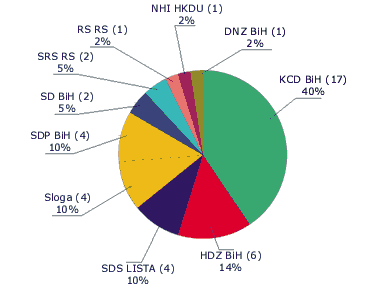Politics in November 1999
*Four years of the Dayton agreement
This November marked the fourth year since the signing of the Dayton agreement, in Dayton, Ohio, American boss. Because of this fact the date had to be celebrated accordingly.
The entire Bosnian delegation got on the plane ("one, united, all together" - satisfied American supervisors). This is a precedence in Bosnian politics, representatives of the three people travelling together for the second time (since the recent visit to Slovenia), on their way to America. The Bosnian presidential trio got together in New York, with Richard Holbrook, the creator of the Dayton agreement. The main discussion was about the border control angency. Discussion, if we consider the talk of the blind and stubborn defensive or personal (national) attitudes that went on forever as a discssion. Until Holbrook slammed his fist on the table. That is how the New York declaration was made. And then they all posed for the press, (un)satisfied and (dis)united.
According to te number of declarations and sessions so far, Bosnia and Hezcegovina should be the most prosperous country in the world. Or among the first five, at least. But, the reality is different.
It is interesting that the oposition representatives also went to America with the "leaders". Their station was Dayton where madaleine Albright was waiting for them. Thanks to them, the discussion showed that not everything in Bosnia is "progress, development, human rights, we hope to get into the European council soon, and us three presidents are smiling and taking pictures together (when we're forced to do so)". Which is good. But, how much are the American politicians prepared to admit the failure of their own international politics (in case of Bosnia, Kosovo/Yugoslavia, then Iraque...), expressed to the american media by the BiH opposition leaders, to their voters?
What has happened during the four years of the Dayton agreement?
Economically, Bosnia is in a humiliating situation. During the process of privatization, everything was stolen and destroyed. If an economic and industrial chaos was acceptable and understandable after the war, it certainly is not today. Especially considering enormous sums of money invested in Bosnia for the last four years, by various international donors.
The return of the refugees was the priority of the Dayton agreement. And how many of those returns actually took place? As many as necessary, it seems. Necessary to avoid sanctions and other kinds of penalties by OHR.
OHR replaced one Minister of Sarajevo kanton because he did nothing about the implementation of Sarajevo declaration (the part concerning the return of the refugees). And the refugees are returning mostly according to ethnic characteristics of the territory. Not "each to their own", as it is popularly stressed, but each to their own ethnic groups.
It is still interesting to observe the situation happening in the Balkan region, and not only concerning the refugees. Factors that caused the local crisis are disappearing (in different ways). Unlike that time when the agreement was actually signed, this time Franjo Tudjman and Slobodan Milosevic were not in Dayton.
Franjo Tudjman, the spiritual master and the leader of (a part) of Bosnian Croats will pass away soon. Tudjman's leaving is being interpreted as one of the biggest chances for a new headway of Croatia and countries around it (especially Bosnia and Herzegovina). Slobodan Milosevic is getting further away from Bosnia and Bosnian Serbs (thanks to his self-isolation). The leaving of those two men will probably mean that the new millenium will bring new relations in Balkan area. Are they going to be better or worse depends on their successors and the people that will elect them.
* Workers movement in Bosnia and Herzegovina at the end of the century
At the end of October, workers from the Bosnian Federation responded to the invitation of the BH Union and had a general strike with a protest meeting in Sarajevo, in front of the Assembly building. The disatisfaction of workers was so big that they finally decided to go out in the streets - stop the production which is producing nothing anyway. The German Union payed for travel expenses (which is logical, because the workers cannot even afford to buy cigarrets), and workers from all over the Federation (we used to say Bosnia and Herzegovina but new borders mean new terminology) came to te meeting in Sarajevo. They also got a support from the Republika Srpska Union which seems to be one of the few RS institutions that has a stabile partner in Federation
(and vice versa).
At first, the Union announced the number of 50 000 people, but I believe the number was much smaller. It was humiliating to see how incompetent the workers are, but on the other hand they are powerless to make any social change. Many of them used the visit to Sarajevo for sightseeing (where they usually can't come because they don't have enough money for their essential needs). I don't think I had great expectations but I was disappointed anyway. The government will continue to ignore the existance and protests of workers until the workers become dangerous.
The role of Edhem Bicakcic, Federation prime-minister, is an interesting part of this story. If there is hell he should burn in it because of the evil things he has done to the people and industry in Bosnia and Herzegovina.
The Union invited him to address the starving and unhappy people. Of course, he refused the invitation, saying that the protest was illegitimate. He also said that the Union itself is an illegitimate institution hiding behind the name BiH while representing just the Federation. By the way, he didn't explain who gave him the legal power to represent BiH for seven years, while he could only represent the Federation. But why should Edhem Bicakcic justify himself in the eyes of the Bosnian people. If we were to understand his logic (if there is one), what rights did the whole Izetbegovic's group have to represent Bosnia nad Herzegovina, while there was nobody from Republika Srpska (which is important in this case) or Herzeg Bosnia. By the way, there were representatives from RS Union in this protest meeting in Sarajevo. I saw them with my own eyes.
The workers will not change anything. They are not able to. Finalization of Bosnian society capitalization will destroy the few industrial complexes that Bicakcic and those like him failed to destroy (for their personal gain, of course).
And I suppose that one cannot live without Bicakcic and his statements in the press. Two months ago he promised to pay four-five pensions until the New year. And a couple of days later he said that it won't happen. This statement still stands. What's next is still unknown, but since the elections are coming up and the voters need a small push (at least with promises since there is no heating)...
For your information, certain economic expert groups say that the Federal government will not be able to pay more that 4 pensions in the year 2000. I suppose that two of them will be payed just before the April elections. So much about Bicakcic and those like him, economy in Bosnia and Herzegovina etc.
*Elections in 2000
 Registration for municipality elections that are to take place in Bosnia and Herzegovina on April 2000, is over.
OSCE annonced the list of 76 parties, 17 independent candidates and 7 coalitions (in Federatin and Republika Srpska) that will take part in the next year's elections.
Registration for municipality elections that are to take place in Bosnia and Herzegovina on April 2000, is over.
OSCE annonced the list of 76 parties, 17 independent candidates and 7 coalitions (in Federatin and Republika Srpska) that will take part in the next year's elections.
It is interesting that Serb Radical Party is not on the list. Few months ago, the temporary election commitee gave this party a condition. They could take part in the election if its leader, Nikola Poplasen withdrew from his position. Since the party didn't respect this condition, it won't be in the elections. How will this effect the work of SRP? It's not for sure, but many people believe that this is the end of it. Ognje Tadic, SRP general secretaire, called upon the people to boycott the elections. I'm not sure it will have any effect.
It is obvious that there is nothing left of the strongest coalition from the previous elections - Coalition for united and Democratic Bosnia and Herzegovina. There were 6 parties in 1997 and 4 parties in 1998 taking part in this coalition. The number reduced to SDA - creators of the coalition and Silajdzic's Party for Bosnia and Herzegovina. Like they are the only ones defending the idea of a democratic and united BiH. Politics of SDA and cheap interests of other parties who joined the coalition, managed to finish it off. Coalition SLOGA is also off the list. Conflicts within the coalition caused the division of its members. Registration deadline will expire at the end of November, but I don't believe in this coalition's registartion.
At the moment, it is still unknown how the election lists will look like. The temporary election commitee declared that the law by which members of the Parliament that are using apartments of pre-war owners cannot take part in this elections, is still valid. Does it mean that Alija Izetbegovic won't be able to participate in the elections, keeping in mind that this gentleman is the subject of many debates concerning apartments? Pre-war owner of the apartment which is currently being enjoyed by one third of BH president wants it back. Well, if Izetbegovic cares so much about returns he keeps signing...
By the end of November we will know the final lists and the rest of the information concerning April. Information on the way.
*SDPBIH in the membership of the Socialist International
While we are talking about elections...
SDPBiH is one of the most serious parties in the up-coming elections. We can see it through its domestic and international activities.
10 years after the fall of the Berlin wall, SDPBiH was accepted as a member of the Socialist International in Paris, three years after having the status of observer. The first socialist party from ex Yugoslavia, and 78th in the members list of the Socialist International. This confirms how serious its work really is. SDPBiH is one of the few BH political options which has regular and productive contacts with international partners (if we exclude contacts of SDA from BiH with SDA in Sanjak and Croatia, for example), which has healthy and civil political programs. Instead of talking about multiethnic society is actually multiethnic.Will the voters see that in the upcoming election or will they be deceived by two pensions from SDA once again...
Registration for municipality elections that are to take place in Bosnia and Herzegovina on April 2000, is over. OSCE annonced the list of 76 parties, 17 independent candidates and 7 coalitions (in Federatin and Republika Srpska) that will take part in the next year's elections.
